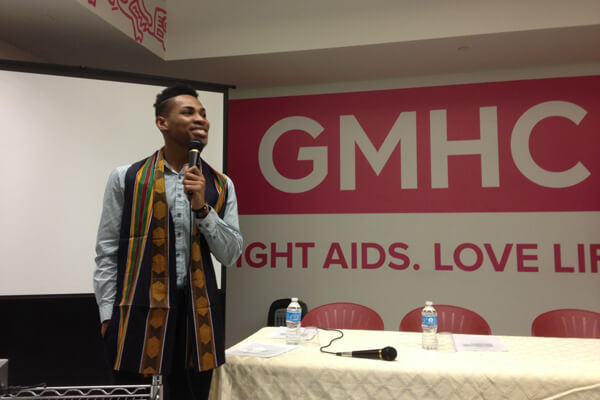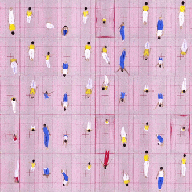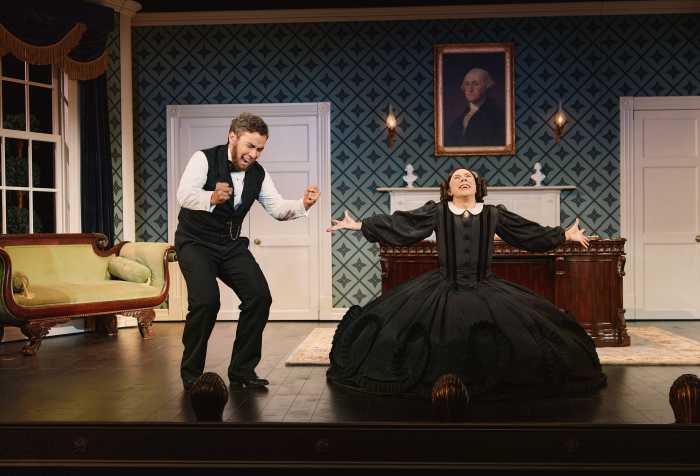Roy Arias and A.J. Cedeño in “Strawberry & Chocolate.” | CAROL ROSEGG
Diego loves the strawberry-flavored; David is partial to chocolate. The significance of these preferences, however, goes far beyond mere ice cream in “Strawberry & Chocolate,” an earnest, three-man drama by Senel Paz based on an award-winning short story he wrote in 1990.
The setting is Havana in the early 1980s, as Fidel Castro’s Communist regime continued to stamp out artistic culture, promote conformity, and violate human rights. Anyone who deviated from the party line was branded a traitor and could be jailed, deported, or worse. Homosexuals were favorite targets.
The play opens with David, a militant student devoted to the revolution, becoming agitated when the effete Diego, a cultured gay man in his 40s, invades his table at the local ice cream shop. In an awkward bid to befriend the sexy revolutionary — and perhaps seduce him — Diego shows him a couple of hard-to-find books by blacklisted authors.
Diego declares that the highly popular chocolate symbolizes machismo (and by extension, the pig-headed Communists). Strawberry, on the other hand, symbolizes more refined, forbidden pleasures.
The socio-political drama suggests that in an ideal world, all flavors of humanity — farmers, soldiers, workers, intellectuals, housewives, homosexuals — should coexist as happily as they do in an ice cream parlor. It also reminds us that there are multiple flavors of gay people as well.
Whether these two polar opposites can respect, appreciate, and, yes, even taste one another’s flavor, is at the heart of the play. The stakes are even higher when another militant student, Miguel, persuades David to feign friendship with the “faggot” to gather enough evidence to have him jailed. It doesn’t take long, however, before David stops faking it and starts feeling it.
If the story sounds familiar, that’s because it was made into the groundbreaking “Fresa y Chocolate” in 1994, the only Cuban film to be nominated for an Academy Award (Best Foreign Film category).
As translated by Eugene Nuñez, Paz has done a good job at reworking the text for the stage. And the set of Diego’s apartment (by Edward E. Haynes), crammed with books, records, and antiques, evokes a wonderfully shabby-chic Cuban abode. Yet under the direction of the acclaimed stage and film veteran Roger Robinson, this tiny play with grand ambitions just doesn’t quite come together.
The performers, while committed, are not up to the level of the material. In the demanding role of Diego, Roy Arias often seems to rush the delivery of his lines. The buff, model-handsome A.J. Cedeño (whose role has been taken over by Frank Huerta since press previews) certainly has David’s anger down pat, but he registers more like a shiny character from a television sitcom. When he complains about being bitten by depression, it’s difficult to believe him. The bearded Andhy Mendez is perhaps the most convincing in the underwritten role of the brooding, intensely homophobic Miguel.
That’s not to say that “Strawberry & Chocolate” is not worth a look. We do root for the two opposites to find common ground, and we admire Diego’s attempts to lure David to his lair full of wondrous forbidden books, like drawing a bee with honey. It’s a delicate seduction of both mind and body.
“There’s always a way to win over a young man, no matter the political system in which you live,” Diego says smugly. “Some like this, some like that, but they all fall. They all have a weak spot.”
STRAWBERRY & CHOCOLATE | International Studio 777 Theater | 777 Eighth Ave. at 47th St. | Through Dec. 29; Thu. at 7 p.m., Fri.-Sat. at 8 p.m.; Sun. at 3 p.m. | $25-$49.50 at strawberryandchocolatetheplay.com or 866-811-4111































